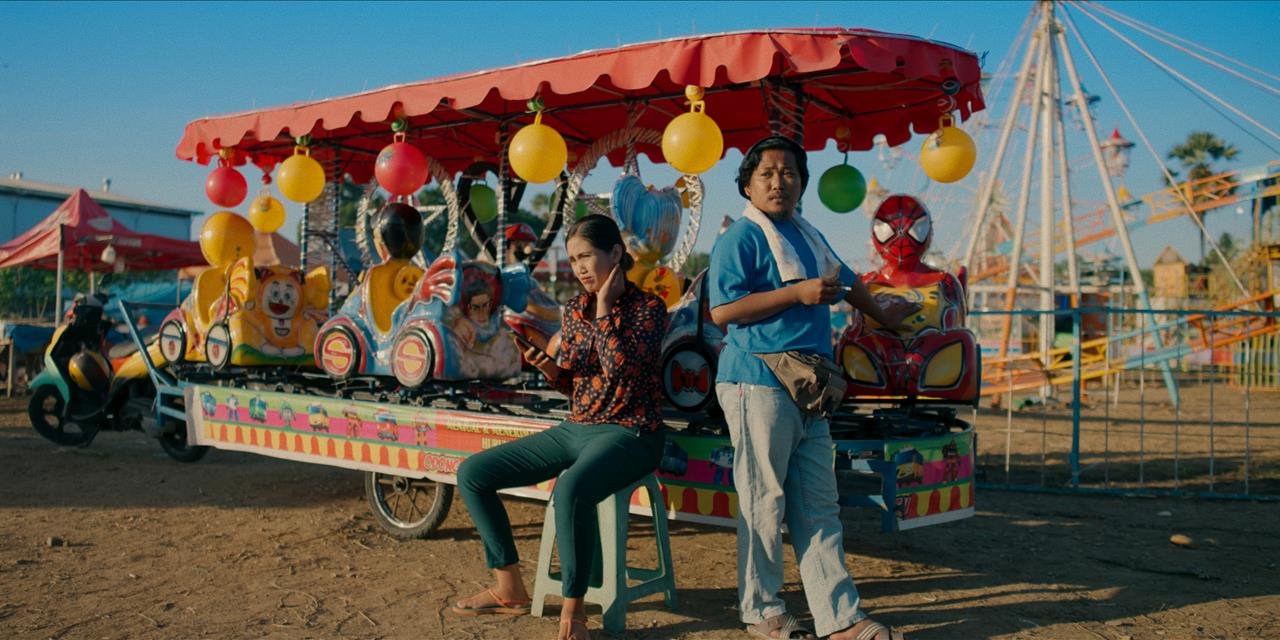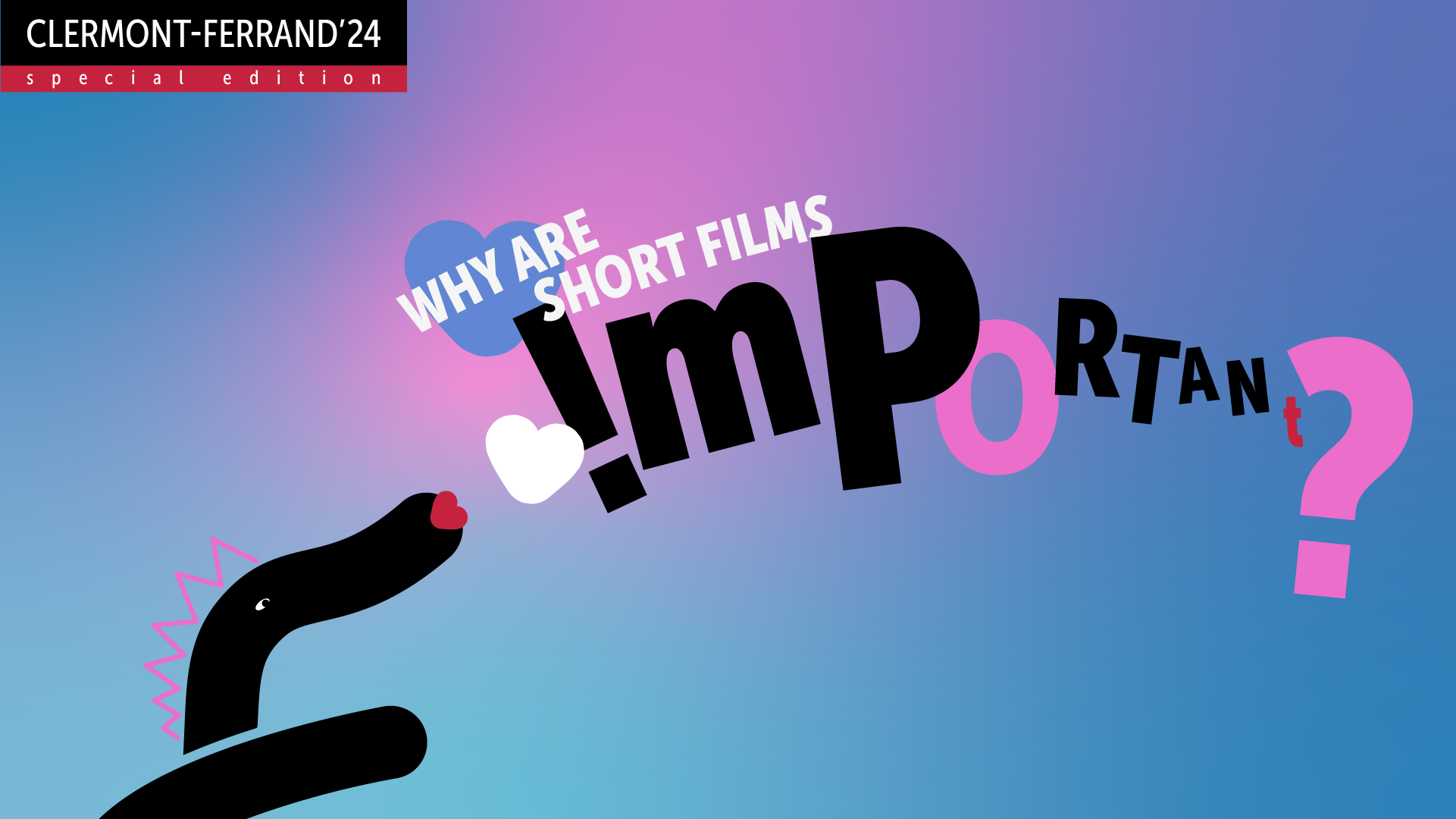The view from the volcano: Clermont-Ferrand as seen by organisers and attendees
Clermont-Ferrand International Short Film Festival is an epic experience for short film lovers, filmmakers, and those in the industry, but last year it came under threat due to funding issues. Jess Sweetman delves into why we need to treasure the festival, and what its films are telling us about the world right now.
Written by Jess Sweetman
Sometime last year the news broke that the celebrated short film festival held annually in the French town of Clermont-Ferrand was in trouble. One of the major funders of the festival announced a surprise 50% cut in their subsidy for the 2023 edition - that had already taken place.
The cut dealt a blow to a much-beloved institution, and filmmakers, programmers, industry types and short film lovers from across the globe spoke out to protect the festival. Petitions were signed and voices were raised.
According to Julie Rousson, who coordinates the Clermont-Ferrand Short Film Market:
“the national and international community has been a very important support since last may…our audience has also been very present, and we have realised how attached people are to our event.”
And attached they are, for good reason - as according to their statistics, the 2023 edition saw nearly 4,000 credentialed professionals attending the Short Film Market, and the festival included 453 screenings.
For me, attending Clermont-Ferrand for the first time last year with Festival Formula, felt like a Mecca for film nerds, a glorious reminder that there’s nothing better than finding people from all over who are as weirdly obsessed about this one thing as you are.
But it’s not just geeks finding common ground that makes the film festival special, and I spent a few vital hours haranguing the good people of the Clermont-Ferrand Short Film Market, the largest of its ilk in the world for industry and filmmakers in the short film realm, to find out what drew so many people there from far and wide.
Let’s start with Julie Rousson
I ask what makes the Clermont-Ferrand Short Film Market so important to the industry: “The Short Film Market is the annual gathering of short film professionals. It kicks off the year, bringing together key players in the sector and those who are just starting out (who represent 25% of professionals present every year). It is a profoundly international event, with participants from all five continents. It is a place for artistic dialogue and economic exchanges.”
The View from the National Film Agencies:
Julia Kühne Escola from the German Short Film Agency, AG Kurzfilm has attended the festival circuit as a film fan, but this is her first year as a representative on the Market:
“everybody is really kind. there are so many people who know each other and it's really nice to see how everybody comes back…it makes it really easy to connect to people and to get the conversation started.”
“I think the international base here is really unique” she adds “it's more international and this is really important.”
Isabelle Cuadros from Colombia is also a first-timer at the festival, although her teammates have been attending for years and hosting a stand on behalf of the Colombian national film agency Proimágenes, which resources and publicises Colombian film.
“I think it's very special that they give a specific time and place for their short film format, because I think it's a format that sometimes is under-appreciated in the whole industry.”
Kate Ianiuk is person-ing the Ukrainian Films stand, she’s also repping the Kiev International Film Festival. This is her second time at the fest:
“It's an amazing festival, it definitely is the biggest meeting point for people from the industry in the world, and probably the only point you’d need to start from if you want to understand how the industry generally works.”
The Educational / Experiential Point of View
Of course we’re not going through this article without tapping up the knowledge of our very own Katie Bignell. Festival Formula have been hosting a stand at Clermont-Ferrand Short Film Market for years at this point. I ask Katie why she thinks the festival is an important place for filmmakers:
“it is somewhere that we always recommend to come to, even if you're not selected, because it's such a brilliant experience.
You get to see some films, you get to meet some industry and - from our perspective, because we're dealing with film festivals - as a filmmaker you get to go and talk to these film festivals directly, which you don't get to do most of the time because you're behind a screen.”
The stand opposite ours represents the African contingent at Clermont - and among the film festival representatives is Yoro Mbaye, from Dakar Court Film Festival, Senegal. Yoro has been to the festival five previous times, he’s a veteran of the market, representing not only his film festival but also a training centre for young filmmakers that he helps to run in Dakar, providing free training on post-production.
His passion for cinema comes from the perspective of what it can teach young filmmakers, namely “patience and passion”, the “two weapons” every filmmaker must have and also must keep learning. “It's a way to promote young talent,” Yoro says of Clermont-Ferrand, “you meet so many professionals …, and it helps, as a director, as a producer to meet, contact, and perhaps work together in the future.”
Filmmaker’s point of view:
I meet the filmmaker Zidni Rizky Rahmatullah on the Indonesian film stand, which is my favourite stand on the short film market, always filled with funny and chatty filmmakers and professionals, hanging out while Godtzilla hangs out behind them wearing 3D glasses.
It’s his second time in Europe with his short documentary “Romansa di Balik Pagar Akal”, but his first time at Clermont:
“I couldn't believe that my movie came to Europe.It's like a good dream to me!” he says with enthusiasm.
And what is there at the festival for a budding filmmaker?
“there is a lot of potential here,” he divulges. “i got some networking in around the world, i met a producer, i met a distributor, i met screenwriters, so we can arrange to collaborate on our next project.”
Zidni is not messing around.
And why should he? Indonesian shorts are arguably having a moment. Just as their feature siblings are becoming more common fare on Netflix, Indonesian short films are popping up on the festival circuit. Fittingly, my next chat is with the director, writer, editor and visual effects artist of “Basri and Salma in a Never Ending Comedy”, Khozy Rizal, whose funny, campy, beautiful short was the first Indonesian short film to make it to the main competition at Cannes Film Festival:
“It's really surprising that this film that is a very pop, campy, not like a film festival film, actually went to lots of places” he laughs.
I ask him how the screening felt at Clermont-Ferrand: “I was so overwhelmed because there were thousands of people. We screened the film in the theatre which contains 101,400 viewers, which is so awesome…so many people came to us and really loved the film.”
And why does he love the festival? “They really take care of us. The filmmakers, they cover almost everything…They have lots of parties and we dance a lot!”
I met filmmaking (and life) partners Abbas Taheri and Delaram Fathi the previous year at one of Clermont’s parties (well, a dinner - I may be at an international film festival but I still baulk at a post-10pm bedtime.) They were screening their short film “Aban” - a film about a child trying to receive gender-affirming care in Iran. This year they’re back with “There Is No Friend’s House” a poignant short about the limits of friendship for two teenage girls struggling with life under the Iranian regime - which left the festival with the National Prize for Student Film.
What do they feel about the festival? Delaram says: “I'm just going to say it's great. It's held in a little city, but how the people care about these films is great.”
Abbas continues: “There are different age groups that are coming to watch. They stand and wait in line, there are queues to get entry to the cinema, and that is amazing.”
But once we’ve done the festival love - what about the films themselves? I’m curious to find out if there are trends being repeated in the short film world. How does the filmmaking on display say about the collective unconscious of the world around us?
Let’s lead with Julie Rousson again:
“i don't really like the word "trends" to speak about short film... short films have always been political. and i think it is our role, as festivals, to give the stage to those that are speaking out about their struggles, to make it about them.”
Delaram shares a similar thought about the situation in Iran:
“right now, we have a chaotic situation in ran and our young generation are trying to make changes because they are aware of the value of democracy, equal rights, freedom and gender equality. and i’m seeing right now in the short films how this generation are to be shown - they're fighting and this is reflected in these short films.”
But it’s not just about the politics, says Abbas: “The reason that we love Iranian short films is that they are very different from each other... Filmmaking is popular in Iran, so some filmmakers like to make genre films, some people like to make slow films, and the girls want to tell their stories (about) their unique experience. People from different locations, different ethnic groups of Iran (are) trying to tell their own group stories.”
I get a similar impression from Kate Ianiuk, representing the Ukranian Film agency. Since 2022 the ongoing war has been a subject in many of their offerings: “generally now it's also about the consequences, about looking into the future after the war, how it can probably be done.” But she also adds: “There are a lot of films that continue to dream - some romantic stories, some animated stories for kids.”
From “Basri and Salma in a Never-Ending Comedy”
Indonesia is a country made up of 17,508 islands and over 800 languages spoken, so they lead with diversity as a draw for their film collection at the festival. According to Zidney:
“we can produce a lot of films with a lot of variation, with the colours of our tradition. we can introduce our culture to the world with our films. i believe that is amazing.”
Khozy is effervescent about Indonesia’s short film scene: “I think most of the filmmakers, especially the young filmmakers…their literacy of short films is getting more rich. They started to think that this medium is special. It has so much freedom in it and they just started to be more expressive and be more experimental…they let themselves be authentic.”
Yoro doesn’t try to hide his excitement for what’s happening in the film industry from Senegal right now either. Previously, a lot of post-production for films coming out of Dakar was done in Europe, something Yoro and his colleagues are changing, one student at a time: “Our main activity is post-production because we understood early on that we need that in West Africa, because several movies can't go until the end because they don't have the means to do post-production.”
“My own short, which is a work in progress now, the post-production was done by one of our students. I am so happy with the work.”
So Is this the Final Call?
Clermont-Ferrand Short Film Festival may still be going, but it highlights a precariousness around precious film festivals that everyone who cares about the art form should be very aware of. To quote Rousson again:
“i think any small gesture of support is important. we all have a role to play in preserving spaces for the distribution, promotion, and financing of short films and their freedom of tone and creation. it is more complex in some countries for shorts, festivals, and professional events to exist for financial or political reasons. industry and short film community support are crucial for that.”
And it’s with a bittersweet feeling that I’m leaving Clermont-Ferrand, knowing that there but for the grace of funding initiatives, public support, and passion - goes this beautifully precarious film festival. The reason we love it so much is because we know that, as with any less-celebrated realm of the arts world, if we don’t shout about it then no one will. If we don’t maintain it, then it will crumble to dust, and if we don’t participate, there will be no more festival to participate in.
Back to Julie: “I think it only underscores that culture faces the same problems as the rest of society: public policies pushing towards increasing privatisation and competition, the independence of events being questioned, and we are a bit torn between a very strong sense of community and a division that is taking root everywhere.”
One of the main reasons I love films is that cinema can literally place you in someone else’s shoes - and it’s so much harder to hate someone once you have shared their joys, their sorrows, their essential humanity through their eyes.
Cinema is a force to bring people together through an essential shared humanity. Clermont-Ferrand Film Festival is a way to bring filmmakers together to use their voices for this very purpose - along with the resources that can amplify those voices before a passionate audience. But this platform to share essential stories is precious and delicate, and we must be careful never to take this for granted.
So I’ll let Julie have the last word, a plea, a reminder to fight for what we love: “We must stay united, defend the work of filmmakers, and ensure that we continue to hear them.”
















